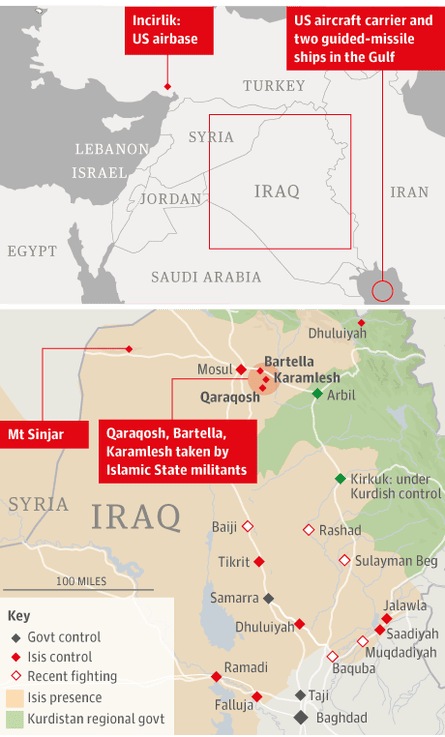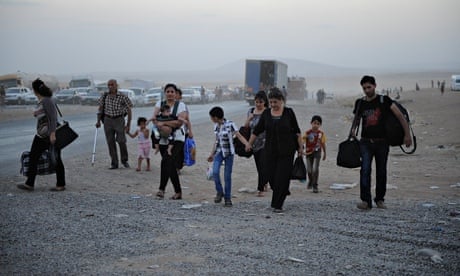US military aircraft have dropped food and water for thousands of besieged Iraqis trapped by the the Islamist militant group Isis, Barack Obama has confirmed, with the president also authorising air strikes against the insurgents if they advancde towards US forces.
The delivery of relief took place after a day of intense debate at the White House over how to respond to an Isis army that has caused mass civilian displacement as it moves closer to previously stable Iraqi Kurdistan.
"We need to act, and act now … today, America is coming to help," the US president said after officials announced the drop.
The air drop was the first non-supply, non-surveillance and non-transport mission the US has flown over Iraq since the 2011 troop withdrawal. The Obama administration ordered the aid mission to help besieged religious minorities chased up a mountain by militants.
Qaraqosh, Iraq's largest Christian city, was left all but abandoned as the jihadist group Islamic State (Isis) advanced through minority communities in the country's north-west and towards the Kurdish stronghold of Irbil. Late on Thursday night the UN security council condemned the attacks and urged international support for the Iraqi government.
The US military is already helping the Iraqi government co-ordinate air drops of vital supplies to at least 40,000 Iraqis, mostly from the Yazidi minority, trapped on top of Mount Sinjar in the north after death threats from the Islamists who have overrun much of Sunni and northern Iraq.
On Thursday, Pentagon officials at first repeatedly and categorically denied numerous reports claiming US air strikes or aid drops had begun, while internally the Obama administration urgently debated providing direct humanitarian air drops for Yazidis suffering without food or water, and even air strikes – a fateful step that Obama has been reluctant to take during the rise of Isis.
"We have been working urgently and directly with officials in Baghdad and Irbil to co-ordinate Iraqi airdrops to people in need," a US defence official said on condition of anonymity.
The official said the US was in constant co-ordination with the Iraqi government on "how we can help co-ordinate additional relief, enhance their efforts and provide direct assistance wherever possible."
The air drop and potential strikes represent the first aerial campaign over Iraq since 2011 for a purpose beyond conducting surveillance on Isis, providing long-scheduled military sales or transporting the extra hundreds of US special operations "advisers" that Obama ordered into Iraq to help Baghdad confront the insurgency.

At the White House, press secretary Josh Earnest said the Yazidi case, as well as the mass internal displacement of Iraqi Christians, represented an "urgent humanitarian situation". He noted that Obama launched an air war against Libya's Muammar Gaddafi in 2011 to forestall a bloodbath.
"There are times where the president has taken military action, sometimes in consultation with our allies, to protect innocent, vulnerable civilian populations from slaughter or other dire humanitarian situations," Earnest said.
Earnest reiterated a central contention Obama has often made about the root causes of Iraq's latest crisis – one that tacitly hinges lethal aid, which has been requested by the Iraqi government, on major Iraqi political reforms. "There are no [US] military solutions to the very difficult problems that exist in Iraq," Earnest said. "The failure of Iraq's political situation early on is what led to this situation."
Obama's national security team considers that a guidepost for avoiding a return to a bloody entanglement in Iraq and recognising the limits of US power. His critics, and some foreign allies, consider it a signal of inaction.
Over the past several weeks hundreds of American "advisers" – mostly elite military forces – have established joint operations centres in Baghdad and in the Kurdish regional capital of Irbil. Those operations centres host US forces capable of spotting for potential air strikes.
One option for US air missions is to launch from Incirlik air base, which the Americans share with the Turks and Britain's RAF, just outside the city of Adana on Turkey's southern Mediterranean coastline.
It was a vital hub in both Afghan and Iraq wars, particularly for military air cargo. Its 10,000 ft main runway can accommodate giant C17 air transport planes, which can easily cover the 435 miles to the stranded Yazidi population on Mount Sinjar. Ankara announced earlier in the day that Turkish food parcels had been air-dropped for the Yazidis by Iraqi helicopters.
The base was important strategically during the Cold War because of its close proximity to the Soviet Union. As a hangover from those days it still houses some of the few US nuclear weapons left in Europe, B61 gravity bombs, in hardened shelters on the base.
UN officials say an estimated 200,000 new refugees are seeking sanctuary in the Kurdish north from Islamic extremists who have pursued them since the weekend. Qaraqosh, south-east of Mosul and home to around 50,000 Christians, was the latest to fall, with most residents fleeing before dawn on Thursday as convoys of extremists drew near.
Other Christian towns near Mosul, including Tel Askof, Tel Keif and Qaramless, have also largely been emptied. Those who remained behind were reportedly given the same stark choice given to other minorities, including Yazidis: flee, convert to Islam or be killed.
Christians, Yazidis and Turkmen have been at the frontline of Iraq's war with Isis ever since the jihadist group stormed into Mosul and Tikrit in mid-June. The Iraqi army capitulated within hours, with at least 60,000 officers and soldiers fleeing on the first day of the assault alone.
Ever since, the jihadists have continued to make advances, while Iraqi troops have concentrated on defending Baghdad and the Shia south, leaving the defence of minorities in the north to the Kurdish peshmurga.
However, even the much vaunted Kurdish forces were no match for the heavy weapons wielded by the jihadists as they advanced in recent days. Peshmurga officers ordered troops to withdraw to areas administered by the Kurdish regional government – a clear sign of priorities and of where the battle lines are being drawn.
Without any protection, Yazidis, Christians and Turkmen are being uprooted from communities they have lived in for millennia and the geo-social fabric of Iraq is being rapidly shredded.
While those who have managed to flee the Christian areas have so far had a relatively safe passage to Irbil, the tens of thousands of Yazidis remain besieged near Sinjar, with little food or water. The UN said it was able to get some supplies overland to the stranded hordes – avoiding Isis fighters who have surrounded most of Mount Sinjar. Turkish foreign minister Ahmet Davutoglu announced that Turkish helicopters had dropped food and water on the mountain top. Iraqi helicopters have also made food drops, but stranded Yazidis say they do not have enough to survive.
The Chaldean archbishop of Kirkuk, Joseph Thomas, described the situation in northern Iraq as "catastrophic, a crisis beyond imagination". He demanded urgent intervention to save what remained of the area's Christian heritage.
Kurdish officials on Thursday demanded more help in catering for refugees. The Kurdish administered areas have seen staggering numbers cross their notional border since the original Isis onslaught two months ago. In the first week alone, some 500,000 people are thought to have fled towards Irbil.
The capital of the Kurdish north is already home to a new Chaldean Christian community, which fled Baghdad in the wake of an Isis-led massacre inside a cathedral in October 2010. Many fleeing Christians have headed for the Ainkawa neighbourhood, which is home to Baghdad's Christian exiles.
The past 11 years of war and insurrection since the US invasion have led to most of Iraq's Christians fleeing. Numbers have plummeted starkly from an estimated one million before 2003 to around 150,000 now. A large number of those who remain are now displaced.
Miriam Dagher, 53, from Qaraqosh, said churches in the city had already been torched and religious insignia smashed. "We stayed as long as we could," she said. "But nothing could save us. This is the end of our community."
Isis has threatened to redraw the unitary borders that were carved out of the ruins of the Ottoman empire. The group's rampant insurgency and the inability of state actors to stop it has rendered the frontier between Iraq and Syria evermore irrelevant.
In the absence of central government authority, Shia militias are taking dominant roles, amplifying sectarian enmity between Islam's two most dominant sects.
Iraq's beleaguered prime minister, Nouri al-Maliki, no longer has the authority to unite the country's disparate sects. Maliki, a Shia Muslim, had disenfranchised much of the country's Sunni community over the past three years, some of whom have turned to Isis as a means of reasserting themselves.
After digging in for the past two months, Maliki now faces a desperate battle to form a government, with his key backer Iran understood to have told him that it no longer supports his bid to lead the country for a third term.
Massoud Barazani, a Kurdish leader, has said he is moving towards holding a referendum that could pave the way for an independence bid, a move that could spell the end of Iraq, and unsettle surrounding countries, including Syria, Turkey and Iran.
The UN security council warned that the Isis attacks could constitute crimes against humanity and that those responsible should be held accountable. "The members of the security council also urge all parties to stop human rights violations and abuses and ensure humanitarian access and facilitate the delivery of assistance to those fleeing the violence," said Britain's UN ambassador Mark Lyall Grant, reading from a statement after an emergency consultation requested by France.

Comments (…)
Sign in or create your Guardian account to join the discussion